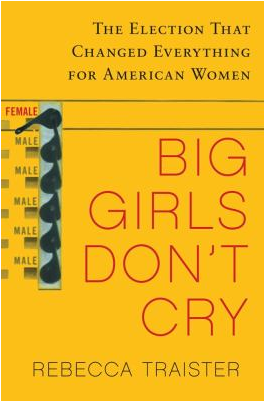Big Girls Don’t Cry: The Election that Changed Everything for American Women

As we entered our hotel after a day of sightseeing while on vacation in New York City in September 1984, my father lifted me onto his shoulders so I could see what the fuss was all about in the lobby. The lights were bright and there were lots of tall men in suits all around us. With my father’s direction, I could see the backs of the heads of the Democratic presidential and vice-presidential candidates trying to navigate the crowd. I can still picture the back of Geraldine Ferraro’s head; all I remember from that moment was that her hair was blond and in a hairstyle similar to my mother’s.
Rebecca Traister, a writer for Salon, introduces her blow-by-blow account of the 2008 presidential election with her first political memory from 1984: in the voting booth with her mom turning the lever to make a selection for the first female candidate to appear on a Democratic ticket for president. Traister and I are both in our mid-thirties, and I would argue that her experience in the most recent political election is representative of our generation of feminists.
Her book, Big Girls Don’t Cry: The Election that Changed Everything for American Women, provides a detailed and thrilling account of that epic race, including astute observations from a feminist perspective. She uniquely intertwines her personal interpretations with the nitty-gritty details of the historic campaigns, including critical reactions from feminists and women regarding the gendered nature of the media response and public debate surrounding Hilary Clinton, Michelle Obama, Sarah Palin, and other women involved in the election. She argues that the 2008 Presidential Race was a modern-day consciousness raising experience for a generation of women who grew up with easy access and little personal experience with—or at least little critical observation of—the patriarchal structures that surround them in the twenty-first century. She says that the story she tells is “about the country and its culture, how well we all reacted to the arrival of these surprising new figures on the presidential stage and what they showed us about how far we had come and how far we had yet to go.”
I found her internal struggle regarding which candidate to support during the primaries so similar to my own experience and resonant with the experience of many women in the United States during this election. She relies heavily on interviews with women—particularly feminists—from all corners of society. She interviews second wave feminists, pundits, journalists, bloggers, and newcomers to feminism as she exposes the gendered bias towards candidates that was not sufficiently or substantively addressed in the mainstream media during the election cycle. The overt sexism, the race/gender divide, and a nascent, conservative (and therefore questionable) feminist uprising are all analyzed ruthlessly and succinctly. Traister writes with command, intelligence, and a sense of humor.
Speaking of humor, she also discusses the role of comedians with a feminist twist, like Tina Fey and Amy Poehler, as well as the role of women journalists, like Katie Couric and Rachel Maddow, all of whom were integral in the cultural interpretations of these political figures. Traister validates and applauds their roles in the process of influencing the electorate regarding gender interpretations of the election as well as long held biases against women in comedy and news.
The frequent refrain in Traister’s book is one in which she considers her mother. She tries to bring together the generations by using her personal connection to her mom’s politics along with the positions of second wave feminists and younger feminists like herself. She wonders how we can be dealing with these same issues that her mom dealt with so many years ago and she answers those questions both personally and politically. Though she highlights the differences in generations of feminists, she finds a way to unite their stories and experiences as they converge on this highly anticipated and much debated event in American history.